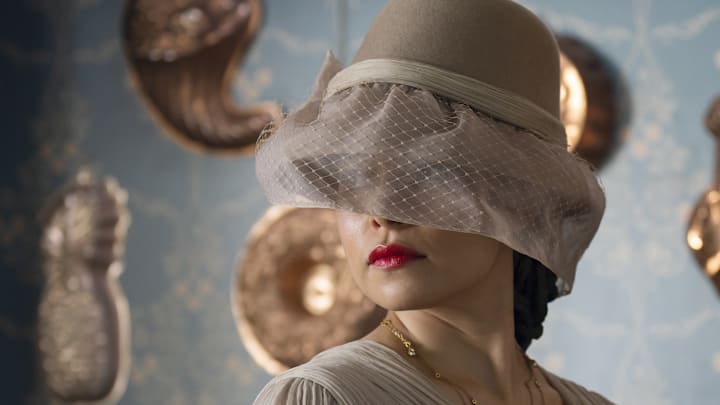Disney+ has made a lot of big changes to Rick Riordan's Percy Jackson books in the first few episodes of its new show, Percy Jackson and the Olympians. After the third episode of the series, "We Visit Aunty Em's Garden Emporium," members of the creative team talked to Variety about a big change from the book involving Medusa, played by Jessica Parker Kennedy in the series.
In the first book in Riordan's series, The Lightning Thief, Percy (Walker Scobell), Annabeth (Leah Jeffries), and Grover (Aryan Simhadri) stumble upon Medusa's garden emporium, where the Gorgon has been turning humans, satyrs, and others to stone for a long time. There, Aunty Em, soon to be revealed as Medusa, serves the trio lunch before trying to turn them to stone. Grover, who finds his uncle Ferdinand among Medusa's stone victims, and Annabeth try to convince Percy to leave, but Percy kind of does things his way. He's stubborn like that. Eventually, Percy slices off Medusa's head and sends it to Olympus as a sort of gift, which comes into play later in the story.
Things play out similarly on the TV show, although there are some slight differences. The trio is on the run from the Furies and decide to enter Aunty Em's fully knowing that Medusa is Medusa. It fixes one problem (escape Alecto), but it creates another (Medusa wants to turn them to stone). It mostly goes down the same way as in the book, with Medusa offering them lunch and all that, but the key difference is how the series delves into Medusa's story, drawn from the original Greek myth.
As the legend goes, Medusa is a priestess of Athena who devotes her life to the Goddess while nothing from Athena is offered in return. When Poseidon and Medusa meet, Medusa believes that Poseidon loves her. Something happens in a temple and Athena curses Medusa. She turns her into a Gorgon who will never be able to accept love from another because she turns all who truly see her into stone.
In the series, Medusa recites a version of that story to Annabeth, Percy, and Grover, making it clear that Poseidon, Percy's father, abused his power and tossed her aside while Athena punished her out of spite. It's an inside look at how the Gods treat humans who worship them. Athena, a just Goddess according to Annabeth, is no exception.
Jon Steinberg, the co-showrunner of the series, revealed why they allowed Medusa to share her side of the story, which doesn't happen in the books.:
"If you know what she’s talking about, you know what she’s talking about. If you’re too young to be in that conversation, it won’t bother you. You’re just in a scene about this woman who seems complicated."
Percy chopping off Medusa's head is a direct reference to the mythology of Perseus chopping off Medusa's head and presenting it to Athena, but it's also a reference to a moment with Percy's mother Sally (Virginia Kull) and Percy from the first minutes of the series. Sally reminds Percy that not everyone who looks like a monster is a monster, nor are all those who look like heroes actually heroes.
Within the story, Kennedy chose to play the character of Medusa in a particular way. She elaborated on why to Variety:
"Jon wrote a story of [Medusa] thinking that [Poseidon] was someone she could trust, and he broke that trust. She was feeling safe, and then the situation turned unsafe. So I chose to play that she was a victim of rape and total abandonment, not understanding why Athena would turn on her."
This change is important in a number of ways. First, it allows the writers to create a three-dimensional picture of this world and Greek mythology. The book, as producer Rebecca Riordan pointed out to Variety, is told from Percy's first person point of view. There's not a lot of room, especially early in the story, to explore Medusa's side simply based on how much time that would take and how important it is to get the story, the quest, and Percy's development going.
Rick Riordan, the author of the books and executive producer of the series, also weighed in:
"As a 12-year-old boy in 2005, I don’t think he had the bandwidth for deconstructing the patriarchy. He was looking at it as, ‘This is a scary woman who’s trying to turn me into stone.'"
Most importantly, this change from the books gives the creative team the ability to read between the lines of mythology and portray these stories in ways that we haven't seen before. Many fans might not understand the story of Medusa because the character routinely appears in media as a scary monster, but Percy Jackson and the Olympians flips that on its head by allowing Medusa to tell her version of events. As Riordan points out, that story is about "abuse of power."
Riordan's book series isn't anti-Greek Gods, but it doesn't portray them in a positive light either. There are so many stories like Medusa's, and I can't wait to see how they play into the show.
To stay up to date on everything fantasy, science fiction, and WiC, follow our all-encompassing Facebook page and sign up for our exclusive newsletter.
Get HBO, Starz, Showtime and MORE for FREE with a no-risk, 7-day free trial of Amazon Channels
